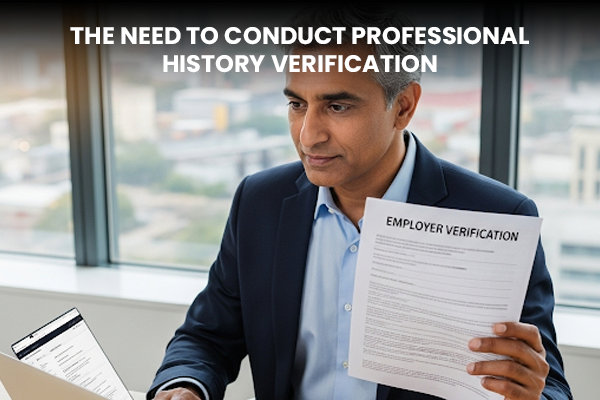Why Previous Employer Check and Servant Verification Are Vital for Trust and Safety

In present times, the issues about work and home have sympathetic or affirmative considerations, wherein trust is paramount for its existence in any sort of dealings. This can also mean that without an assurance of faith in an individual or team, security, productivity, and peace of mind may considerably wither away. Two processes-prior to hiring-profile history validation and qualifications verification for domestic help, are most prudent in risk avoidance, placing safety first, and making secure choices.
The Need to Conduct Professional History Verification
New hires are an investment. Beyond the skill sets that include a resume, an organization needs to have confidence in the character, reliability, as well as past behavior of a new hire. Therefore, besides their interviews and reference checks, an organization needs to conduct professional history checks. Since interviews and references can be hardly credible bases for decisions, one needs professional verification.
The Complete Employer Check goes way beyond mere checks with references. It entails an ordered verification of how long a candidate claims having been employed, what positions, duties, and responsibilities he/she held, and, more importantly, the reason given for absconding and whether there is some possibility of rehire. Only this way could actual facts be established about a candidate’s work ethic, conduct skills, and interpersonal relations from a person who has experienced them firsthand.
Skipping a check like this can seriously impact a company. If a candidate proves wrong or unsuitable, the ensuing damages are lowered in team spirit, lost productivity, possible financial loss, or, even worse, possible reputational damage. The good Previous Employer Check must be a non-negotiable step in your onboarding procedure. It gives you a factual record through which to test your candidate’s assertion, the candidate’s history versus your set of for your company.
The Need for Domestic Helper Screening
Meticulous checks are required even for the home. The engagement of domestic help means giving entry to someone in your private realm, the family, their possessions, and sometimes an area that is sensitive. Safety and security, thus, become paramount issues.
The need for Servant Verification becomes apparent here. This process is more comprehensive than a mere interview. It is a detailed background check conducted by an agency that verifies address history, criminal records, and cross-checks both personal and professional references pertinent to domestic functions. In building a complete profile on the reliability and character of an individual, the objective shall be set forth.
The refusal of professional Servant Verification leaves a family in a world of numerous threats-thievery, negligence, and worse safety concerns. A professional and structured kind of verification offers families empirical data and professional assessment, turning a decision from a kind of gut feeling into one based on evidence. This due diligence becomes the key to establishing an environment of safety and security at home.
This list describes operational benefits and risk mitigation measures offered by verification protocols.
Enhanced Safety and Security: From extending internal threats, human rights protection, or safeguarding assets, employees are verified for various considerations.
Improved Quality of Hire: Background checks, for example, help business entities with hiring good-quality people who end up costing less in turnover and make for better teams.
Informed Decision Making: Both processes rely on evidence instead of assumptions, so one knows exactly who is entering their establishment or home.
Protection of Reputation: One unvetted employee can stain an organization’s brand or a family’s standing. A stand-alone reputational check can go a long way.
Fostering Culture of Trust: When people in an office or at home have been truly verified, it can provide a baseline on which trust is built, allowing relationships to prosper, and there being productivity wrapped in suspicion.
Writing Verification into Your Process
Consistency and thoroughness are important as well as to be ingrained in standard operating procedures; otherwise, these measures stand to lose their worth. This is the moment a platform such as Force Track becomes immensely useful. Manual-based approaches take time and are subject to potential human errors. Consequently, a digital solution can guarantee that these checks are appropriately carried out every single time for every candidate with absolute rigor.”
With a platform like Force Track, all tools become available for carrying out a detailed Previous Employer Check efficiently by pooling information to provide distinct reports. Likewise, the framework was designed to cater to the needs of a thorough Servant Verification by handling all the nuances of a domestic background check. By weighing on such a system, companies and individuals would be able to standardize safety, thus making it an integral and seamless part of their hiring protocol.
Conclusion
Regarding the matters of security and trust, hope is not a strategy. Classical means of verifying a candidate’s background in professional work and testing domestic help are not administrative obstacles to be bypassed. They are basic requirements so that you may perform operational or personal risk management in a prudent manner. After all, they cast the light of factual clarity that enables one to confidently move forward in entrusting others with worthy responsibilities. By using Force Track or a similar platform, this being one of many ways to approach verification, you stand to gain in safety, quality, and long-term peace of mind.
Frequently Asked Questions (FAQs)
Q1. What specific information does the Previous Employer Check actually look to confirm?
Ans: Generally, professional verifications will confirm dates of employment, job titles held, key job functions as held by the individual and where policies and laws allow a limited degree of performance related information or eligibility for rehire. This forms a factual account of the candidate’s professional history.
Q2. How does Servant Verification differ from a regular employee background check?
Ans: Whereas both emphasize safety, Servant Checks tailor needs for domestic purposes. Such checks may pay pronounced attention to past performance reviews, to include verifying specific domestic skills and checks that may be of greater relevance to a domestic environment, all to make sure that a complete assessment would be made for personal trust and safety.
Q3. Are there any legal compliance considerations necessary in relation to these checks?
Ans: Yes, indeed. In a background verification, um, you must seek consents. For instance, a candidate must give written consent before any checks are carried out. One must, therefore, ensure that they work with a reputable provider who operates within the confines of the law so that all verifications are rightly and ethically done.
Q4. What is the typical turnaround time for receiving verification results?
Ans: Depending on the nature of the check or the cooperation of ex-employers or referees, turnaround time varies up and down. But an organized digital platform does work greatly in speeding up the whole chain, with many standard checks being resolved within a few days of business.
Q5. Can I carry out these checks manually without an actual service?
Ans: Again, it is possible, but not advisable, given its inconvenience and inconsistency. Making internal calls to reference persons, verifying documents, keeping records of observations-the whole process takes a lot of internal manpower and resources. With such an external service, a standardized and thorough process with legal compliance serves to save time and diminish the chances of missing something.



